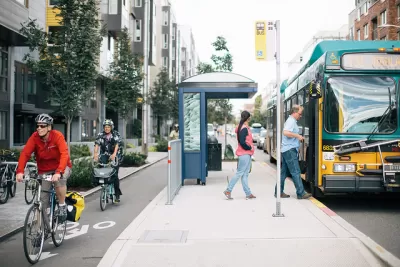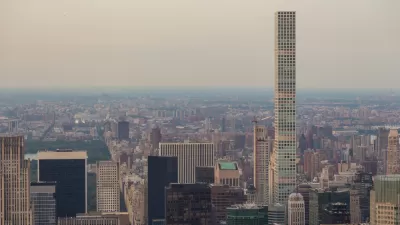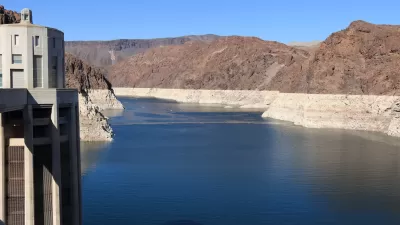As climate change brings prolonged, intense heat waves to cities once associated with rain and cold weather will have to attend to the lack of shelter provided to bus and transit riders.

Michelle Baruchman reports on the state of bus shelters in the city of Seattle, which has weathered a summer beset by record high temperatures—a sign of more heat waves to come as the planet's climate changes.
Baruchman cites data quantifying the city's bus shelters ("Of the approximately 7,500 Metro bus stops across King County, 1,700 have bus shelters…") before interviewing a question-and-answer session with researcher Kevin Lanza, who in 2019 published an article, along with Casey P. Durand, that explored the importance of bus shelters and trees for moderating heat.
In the interview, Lanza states that high temperatures are reducing transit ridership. In Lanza's words:
Trees have been shown to modestly reduce the effect of extreme heat on ridership or reduce the losses of ridership from extreme heat. Bus stop shelters don’t have that same association but both bus stop shelters and trees are proven heat management strategies that can in some specific instances be used exclusively or together to assist with climate adaptation of transportation networks.
While Los Angeles frequently makes news for transit shelter shenanigans, Seattle too passed up a chance to enter a public-private partnership to improve its shelters in 2018. The underfunding and mismanagement of bus and transit shelters is a nationwide problem, as detailed in an article from February 2020.
FULL STORY: How cities can help protect transit riders from extreme heat

Planetizen Federal Action Tracker
A weekly monitor of how Trump’s orders and actions are impacting planners and planning in America.

Congressman Proposes Bill to Rename DC Metro “Trump Train”
The Make Autorail Great Again Act would withhold federal funding to the system until the Washington Metropolitan Area Transit Authority (WMATA), rebrands as the Washington Metropolitan Authority for Greater Access (WMAGA).

The Simple Legislative Tool Transforming Vacant Downtowns
In California, Michigan and Georgia, an easy win is bringing dollars — and delight — back to city centers.

The States Losing Rural Delivery Rooms at an Alarming Pace
In some states, as few as 9% of rural hospitals still deliver babies. As a result, rising pre-term births, no adequate pre-term care and "harrowing" close calls are a growing reality.

The Small South Asian Republic Going all in on EVs
Thanks to one simple policy change less than five years ago, 65% of new cars in this Himalayan country are now electric.

DC Backpedals on Bike Lane Protection, Swaps Barriers for Paint
Citing aesthetic concerns, the city is removing the concrete barriers and flexposts that once separated Arizona Avenue cyclists from motor vehicles.
Urban Design for Planners 1: Software Tools
This six-course series explores essential urban design concepts using open source software and equips planners with the tools they need to participate fully in the urban design process.
Planning for Universal Design
Learn the tools for implementing Universal Design in planning regulations.
Smith Gee Studio
City of Charlotte
City of Camden Redevelopment Agency
City of Astoria
Transportation Research & Education Center (TREC) at Portland State University
US High Speed Rail Association
City of Camden Redevelopment Agency
Municipality of Princeton (NJ)





























